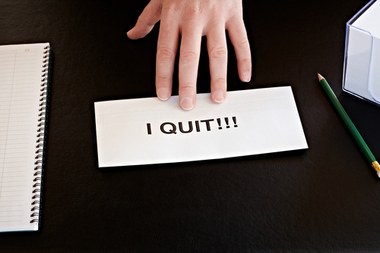At least, that’s what we’ve been told. But there are times that not quitting results in your life being stymied, stressful, and unfulfilling. So let’s get right into it. Quitting can make you a winner by:
1. Allowing you to move forward in your life.
Are you hanging on to old goals that aren’t relevant to you anymore? Or, digging a little deeper, are they someone else’s goals for you? If you find yourself dragging your feet and staying stuck in the same place, maybe you need to quit holding on to those old ambitions that don’t fit you anymore – or never fit you. Clinging tightly to the familiar only holds you back.
2. Reducing stress and creating more time for you.
Did you know that the Latin origin of the word quit meant “calm, resting”? The negative connotation of being a quitter only came into our vernacular seven centuries later in the 1800’s. Are there things you want to quit but can’t bring yourself to say no? How about being on that board for your friend’s non-profit? She said it would only take a little time, but now you’re on three different committees. What about volunteering three days a week at your child’s school rather than one because none of the other parents would pick up the slack? It’s time to quit. Yes, you may have to face your fear and learn to say no, but the rewards in your physical and emotional health will far outweigh your initial discomfort.
3. Creating more emotional and energetic space for you.
Have you ever seen the show Hoarders? People with this disorder pile junk and garbage up in their houses until there is barely room to walk, let alone eat or sleep. Are you an emotional hoarder? Do you collect your negative emotions and the emotional baggage of other people and won’t let go of them? Perhaps all of those thoughts and feelings have created a pile of toxic energy inside you. Maybe it’s time to quit. You’re human so you’re always going to have negative emotions. But quit hanging on to them. Learn to create positive emotions through positive action and let go of the negative energy. And let other people have their own emotional journeys. You don’t need to take on the mood, feelings, or problems of your spouse, family member, or close friend. Clean out your cluttered emotional house and notice how much more energetic space you have left for yourself.
4. Creating new opportunities for you.
In 1934, a seventeen-year-old girl was about to take the stage at the famed Apollo Theater in Harlem for their amateur talent show. She was going to do a dance routine but became intimidated by a dance team that went before her. Suddenly, right before she went on, she made a decision. She decided to quit her long-held plan to dance. She went up to the stage manager, tugged at his sleeve and said: The young woman’s name was Ella Fitzgerald. She won that show (and $25) and went on to a legendary career as a jazz singer. What opportunities might open up for you if you quit something dear to you? Something that you loved but has run its course? Nilofer Merchant was an entrepreneur who had built a successful consulting business but, after eleven years, realized her passion for her job had dwindled to nothing. She quit her business. And opportunity after opportunity arose for her, many of which re-ignited her entrepreneurial fire. Is there something you need to quit in order for your passion to be fanned into flame?
5. Empowering yourself to be self-compassionate.
Like most people, you probably have an inner critic that chirps away at you, telling you how bad you are and how much better you could be doing. Kristin Neff, author of Self-Compassion and a pioneering researcher in the field of self-compassion, suggests that this inner critic is something that has evolved over time in order to keep us safe and on track. And that we often see it as a way to keep us in line and motivated. The problem is, it is harsh and judgmental and leads you to believe that, although other people are worthy of kindness and compassion, you aren’t. Neff’s work has found that people who are self-compassionate are much less likely to be depressed, anxious, and stressed, and are much more likely to be happy, resilient, and optimistic about their future. In short, they have better mental health. It’s time to quit fighting with your inner critic and show yourself some compassion. Talk to yourself as you would talk with a good friend who was suffering with a problem. Put your hands over your heart and acknowledge that you’re having a rough time. And remember that all of us have flaws and make mistakes. It’s just part of being human. What do you need to quit to be a winner in your life? (Photo credit: Hand Pushing a Resignation Letter via Shutterstock)
